Text
How to Write Musicians
I hope that this post is helpful for anyone who's writing musician characters! As a musician myself, I love reading about them and definitely encourage people to write them, so much so that I'm actually considering adding instruments like violin or piano into my fantasy world...
1. Determine what type of musician you're writing about
The most typical character that comes to mind is probably the instrument performer, but musicians come in all shapes. Composers, conductors, accompanists, recording artists, etc. etc., do research on what YOUR specific musician character is.
Genre is also an important consideration. A classical musician, rock musician, or jazz musician will probably each have a different approach when it comes to things like:
practicing
performing
attire
friend circles
thought and composition processes
Each musician will probably differ in all the aspects listed above depending on what instrument they play, as well.
Finally, think personal. Musicians, like anyone else, will also have varying goals depending on their personalities. For example, a more shy person might naturally gravitate towards composing offstage, while a spotlight lover could enjoy performing. Or, a fame-driven person might dream of making it on Broadway, while a more modest one aspires to teach music instead.
2. Don't forget to spend time BTS
If you're writing a pro/aspiring pro musician, they will—or should—spend a ridiculous amount of time practicing!
Lots of media like to glorify only the moments onstage. The characters bask in the spotlight and wear fancy clothes and get roses thrown at them, but that's the product of lots of sweating offstage.
Depending on skill and performance level, most professional musicians often practice anywhere from 3-8 hours a day (with many falling in the 4-5 hour range), which is a lot of work. So, dedicate more time featuring the actual practicing, rather than just the performances, or at least have your musician characters MENTION the practicing instead of everyone being a flawlessly sight-reading/photographically memorizing child prodigy.
Writing practice scenes can also be excellent characterization—for example, you can show their patience level in how much they might rage over mistakes, or how perfectionistic they are if they obsessively repeat measures over and over again until they sound flawless.
3. Research their instrument
All instruments have different mechanics and terminology, so do proper research regarding what they're playing.
You may write your character spending time on instrument maintenance; if I were to write about a wind player, for example, I'd have to do a lot of research on things like cleaning a mouthpiece or tightening the joints (I'm just a piano player!).
4. Use specific descriptors
Much like how certain writers use art-specific terms to describe things when writing an artist character's POV, or someone in any other specific discipline, emphasize music's connection to the character's life by using some music terms.
For example, a musician has a higher chance of describing sounds as "percussive" or a "crescendo" than, say, a person who's worked at a blacksmith their entire life.
Don't try to shoehorn in a music term every line, though—like anything else, it'll get overbearing and unnecessary. Be subtle about it! Try to find words that CONNOTE music, but are still generally used outside of it (like "lyrical," or "rhythmic").
5. Read about the lives of actual musicians, current or historical
Like anyone else, each musician can lead a very different life. For example, there were widely celebrated, famous musicians like Liszt, existing in the same era as musicians living in general poverty like Schubert.
With different personalities, writers could also explore various compositional methods and performance stances. Some people like Liszt valued virtuosic playing, sweeping sounds, and impressive, flashy performances, while others like Clara Schumann detested this emphasis on virtuosity and valued simplicity.
Other musicians like Bach or Wagner wrote for greater causes, such as religion or nationalism, respectively. More interesting angles could be taken regarding the musicians composition methods, like Berlioz, who wrote a symphony inspired by unrequited love and insane opium trips.
∘₊✧────── ☾☼☽ ──────✧₊∘
instagram: @ grace_should_write
Let's ignore this random months-long hiatus! Life updates on the gram, soon...
Hope this was helpful, and let me know if you have any questions by commenting, re-blogging, or DMing me on IG. Any and all engagement is appreciated :)
Happy writing, and have a great day!
- grace <3
#writers on tumblr#writing#booktok#writeblr#novel#writer#writerslife#wattpad#writing tips#writergram#wip#media analysis#book recommendations#bookstagram#plot holes#writing ideas#ya fantasy#fantasy#ya fiction#characters#music#musician#classical music#musician on tumblr
15 notes
·
View notes
Text
How to Write Political Intrigue (with book recs)
POLITICAL INTRIGUE! Intrigue in general! What is it?
For the purposes of this post (as well as how it's usually used in the writing/reading community), think: scheming. Plotting. Conspiracies in the shadows, bids for power and survival, secret plans, masterful illusions, all of that stuff.
It could be on any scale that you'd like, from a duel of wits (think Light's and L's game of cat and mouse in Death Note)
...to a large-scale plot involving entire countries and their people (like any espionage networks during any major wars, such as the American Revolutionary War to World War II, and so many more)
...or even medium-sized conflicts (families, like in The Godfather, or smaller national disturbances like the Watergate scandal).
Below are 4 core tips on how you can successfully write (political) intrigue plots:
1. Read + Research
Despite how hard it may sound, it's actually pretty easy to craft a realistic yet thrilling intrigue plot—with so many examples in real life and fiction, you can easily base your plot on an existing one and just change a few things like the characters, setting, and maybe a few plot points.
History and current events are always great places to look to, but here are some books that are chock-full of great politics + intrigue:
Leviathan (Thomas Hobbes): one of the most famous treatises of politics + human nature and their intersection. The book is an in-depth exploration of human nature, government, politics, and all of the root causes of why they exist. While it does take a specific philosophical angle (you might not agree with Hobbes' ideas), they are detailed explanations of how things work + why they are required from one perspective.
48 Laws of Power (Robert Greene): GREAT BOOK for helping you plan out the means by which you want the intrigue to happen. There are lots of simplified rules that tell you why people plan and scheme (e.g. "control the options; get others to play the cards you deal," or "pose as a friend, work as a spy"). There are LOTS of really great small stories of when a rule is applied in real life that are also general plot inspo!
The Godfather (Mario Puzo): very very good, intricate, and more emotional because it deals with the intrigue surrounding families
Joseph Fouché: Portrait of a Politician (Stefan Zweig) (biography): Fouché is absolutely insane. A genius at political intrigue. His life is literally one of the craziest stories of scheming, betrayals, survival, and a general vying for power, especially behind the scenes.
The Prince (Machiavelli): obviously, I can't leave out the original tips + tricks book with explanations of WHY intrigue matters as a means, especially in terms of protecting your power.
Trust Me, I'm Lying (Ryan Holladay): a large part of intrigue plots (you need to cover up the actual game you're playing) is the manipulation of information, creating illusions and spectacles for other people to believe. This book goes in-depth about media manipulation and information wars.
Empire of Pain (Patrick Raden Keefe): takes a rather different angle, through the personal/corporate manipulation of government, as well as how wealth dynasties (especially within families) are established. Remember the opioid crisis? This book explores the generational politics of money and power that led up to that.
Prince of Thorns (Mark Lawrence): Look! Fiction! Anyway, I'm biased because it's one of my favourite works of fiction of all time, but it explores political intrigue not only through an actor participating in it, but through the lens of the common folk. I.e., the consequences all that power play has on the populace due to a lack of actual good governance...
A Song of Ice and Fire (George R. R. Martin): I haven't personally read/watched anything GoT, but it's pretty much obligatory to put this series down in a post about political intrigue. It's famous for doing it well.
2. Plan. Like, meticulously
First of all, decide what scale you want your intrigue to be on: large-scale government/international affairs type, a corporation thing, something between two people, or even within a family? There are so many possibilities.
Intrigue plots are like mysteries; they must be tightly logical to be satisfying. One of the best ways of ensuring this is through analyzing each involved party—the actors.
Each actor has their own motivations, goals, and psychologies. After you establish what they want OUT of their intrigue, think about how they'd go about achieving it: a naturally hot-headed person might try to intimidate their way into getting what they want, or they might learn through the course of the story to cool down a bit.
A naturally imaginative and analytical person might come up with all sorts of scarily genius plans, and near-flawless execution. Of course, they would also react in different ways, depending on personality. Character consistency alone will make your plot seem that much more logical.
However, cracks in logic will happen because humans are inherently imperfect and not always rational. These cracks must be DELIBERATE and realistic and must seem planned out; they can't seem more like the author forgot a detail, or didn't know how to explain something (e.g. something happened and the writer never included the consequence of it because they forgot). It must be clear that it is a flaw on the character's part.
3. Never write intrigue for the sake of the intrigue
The incentive of all scheming comes down to mainly two things: gaining power and keeping it. Of course, you could choose to explore more unusual things, such as characters exercising intrigue to satisfy boredom... (think Light and Ryuk from Death Note).
But, the bids for power, security, and survival can be used to highlight things about human nature. Themes to explore include ambition, sacrifice, the pursuit of happiness, the corruption of character, the preservation of innocence in a cruel system, etc.
4. Explore through a narrow lens
Most intrigue plots are full of complex motivations, characters, goals, and the means they use to achieve said goals.
You should gradually let your intrigue plot unfold through the POV of a few characters, preferably one or two. An omniscient narrator for this type of story is INCREDIBLY difficult to pull off without confusing the reader.
However, more POVs work if you use all of them to focus on ONE or a few intrigue plots only—it can provide a multi-layered effect, exploring the same line of action and consequence through different perspectives. But, if everyone has their own intrigue plot, it's too easy to create a tangled mess where readers can barely delineate one plot from the next.
∘₊✧────── ☾☼☽ ──────✧₊∘
instagram: @ grace_should_write
Sorry for the massive hiatus—I have officially started college!! I've been pre-occupied with settling in, classes starting, a social life, extracurriculars etc. etc...life has been super busy, but great :)
I've started working on my books as well as poetry more recently, and I'm glad I'm getting into a new workflow/lifestyle. It certainly is different, but I'm starting to enjoy it.
Anyway, I'm surprised it took me this long to do a post about this topic, considering the fact that it's basically my writergram niche and my entire personality IRL, but I think it was mainly because I was trying to find a good angle to approach this massive topic. But, stay tuned for (probably) a part 2 because there's SO MUCH MORE to cover.
Hope this was helpful, and let me know if you have any questions by commenting, re-blogging, or DMing me on IG. Any and all engagement is appreciated :)
Happy writing, and have a great day!
- grace <3
#writers on tumblr#writing#booktok#writeblr#novel#writer#writerslife#wattpad#writing tips#writergram#wip#media analysis#book recommendations#bookstagram#plot holes#writing ideas#ya fantasy#fantasy#ya fiction#characters
200 notes
·
View notes
Text
How to Edit Your Novel (Pt. 1)
If you haven't finished writing your first draft yet, feel free to save this for future use :) If you HAVE finished first drafting (BIG CONGRATS! That's a massive accomplishment, and I hope you're super proud of yourself ❤️ ), I really hope this helps you!
There's a lot to get into regarding editing, so this post will focus on more macro edits while part 2 will focus on micro edits.
Reread
In my opinion, one of the MOST IMPORTANT parts of editing is rereading your own book.
I highly recommend printing out your book into a physical copy. Generally, you can print out hundreds of pages at the copy or stationery shop (e.g. Staples), and then put them in a 3-ring binder.
For presets, I highly recommend at least 12 pt. font and DOUBLE-SPACED!!! This is so you can annotate easily DIRECTLY between lines on the paper while you're rereading. For me, I annotate with a red pen. The biggest things to focus on for a first reread are:
Plot + subplots! Example questions:
What things don't make sense?
What things don't you like?
(Spec fiction specific, mostly) Any worldbuilding issues, like no introduction to the cool fantasy gadgets, lore not matching up, or no logistical possibilities (e.g. how do gladiators in your book use modern flush toilets when the world is based on Ancient Rome?)?
Is anything too confusing?
Unnecessary scenes?
Issues with important plot beats (e.g. inciting incident too late, climax too early, etc. depending on how you want your story to flow)?
Characters! Example questions:
Is the development clear?
Are their personalities, motivations, and backstories fleshed out?
Do they have distinct voices that can be relatively easily distinguished in dialogue?
Are their names/appearances/personalities too similar, causing confusion?
Do you have too many or too few characters?
Are the character/group dynamics organic, significant to the plot, and enjoyable to read?
Other things to get picky with include:
tone, mood, voices, general atmosphere
prose issues like dialogue, description, etc.
plot discontinuities (e.g. John has blue eyes in Chapter 4, but in Chapter 6, he has green eyes)
grammar
Go in with your red pen and do whatever you want, as long as you can clearly read what you scribble. Let yourself go wild with *circle* "GRAMMAR ERROR!" or *underline* "STRANGE CHARACTER INTERACTION" or *large bracket spanning paragraph* "BAD SCENE!" Don't worry about making it look "aesthetic," just go for it in whichever way is most efficient for you.
However, for your first reread, or just an earlier one, focusing on the big picture things should be your first priority! Imagine tweaking the prose in one chapter for it to read like the love child of Victor Hugo and Charles Dickens, but then you realize the chapter doesn't serve the plot at all and needs to be cut...
Revision
After rereading, it's time to revise. Revision is the BIG PICTURE, GENERAL edit! Remember those issues that you found? Now, you're actively brainstorming how to fix them. This is not the REWRITING stage yet—that comes after!
Refer back to the list of questions above, and find solutions. I like to do this in a systematic method where I make a table (in this case, using Notion):

You can make this in any spreadsheet software, or even just create columns in a doc or on paper. I sort it by the ISSUE, SOLUTION IDEAS, TYPE OF ISSUE (e.g. character development, worldbuilding), and STATUS (done?).
Of course, doing this in a linear fashion is also fine, where you directly go down the chronological plot order. However, I would suggest separately brainstorming for each issue before you begin this step.
For example:
ISSUE: Heist is too easy and underwhelming
IDEAS:
Increased number of trained security personnel + improved tech (e.g. city hired guards who were former thieves themselves, security cameras, classic laser beams protruding from walls, a door with more locks and a very hard constitution)
In the thief group, more tension between each other -> harder for them to all cooperate and coordinate, leading to some things going wrong
Decreased competence of certain thieves, or just careless mistakes (e.g. tripping, coughing because of dust and attracting attention, not scaling a wall properly, etc.)
After you comb through all the issues like this (or however much effort each issue warrants), you'll find yourself at the REWRITING step! We'll cover that next time :)
∘₊✧────── ☾☼☽ ──────✧₊∘
instagram: @ grace_should_write
I used to dread revising, especially after I'd finished the first draft of my first novel, but now, I quite like the process :) Yesterday, I just finished re-plotting an improved version of my story after LOTS of revising through 4 drafts! I can 100% say that no matter how difficult it is, a thorough revision is totally worth it!!!
OH! Also, goes without saying, but that spreadsheet revision example is NOT a real project hahaha
Hope this was helpful, and let me know if you have any questions by commenting, re-blogging, or DMing me on IG. Any and all engagement is appreciated :)
Happy writing, and have a great day!
- grace <3
#writers on tumblr#writing#writeblr#writerslife#writing tips#booktok#novel#writer#wattpad#writergram#media analysis#writing advice#writing a book#creative writing#writing community#creating characters#characters#fictional characters#editing#editing resources#editing tips#novel writing#ya fantasy#ya fiction
13 notes
·
View notes
Text
How to Write Devastating Betrayals (Pt. 2)
[FIND PT. 1 on @ grace_should_write on IG, or by scrolling through my Tumblr profile!]
Here are more elements + tips on satisfying betrayals that will destroy both your characters AND your readers! Sorry for the wait... 😅 As usual, the examples all contain spoilers!
1. How does the TRAITOR feel?
This is first because I feel it's SO so undercovered. I've definitely seen lots of tips about viscerally describing the feelings of the betrayed, but...how does the traitor feel?
Let's use the example of cheating, universally recognized as one of the biggest forms of romantic betrayal. Obviously, the person getting cheated on will probably feel devastated, but this betrayal can be made even MORE gut-wrenching if the writer explores how the cheater feels.
Maybe there's guilt that occurs before, during, and after the cheating. It might build over time, going from a small tinge to absolutely crippling shame. The cheater will probably realize what they really lost after they get caught. Maybe they reminisce on all the good times they had with their proper partner and immediately feel thrown back into reality, asking themselves how they could ever have done what they did. Maybe, after all this, it still kills them to see their partner so hurt by their actions.
Guilt is one of the most common feelings traitors have after betrayals, but a portrayal of the flip side—a ruthless, pragmatic satisfaction—can also be interesting.
One of the best historical examples I've seen of this is the life of Joseph Fouché, a French politician active from the 1789 French Revolution all the way to 1816, during the Bourbon restoration. For reference, that's a crazy long period of time for any politician to hold so much (albeit behind the stage) power.
Aside from being a master at political scheming and intrigue plots, he was known as a "chameleon"—able to seamlessly and shamelessly shift his loyalties. He never really committed to a single group or person, always joining a group as soon as it became, or had the potential to become, influential, and leaving it (often actively working against it) as soon as the group was projected to lose power.
One of the biggest manifestations of this is the juxtaposition of his own childhood to his adulthood—he was raised and educated in the Church and even taught in a Catholic institution for a while during his young adulthood. He never harboured any sort of hatred against the Church.
Then, when the French Revolution rolled around and religion was seen as highly unpopular and ultra-traditional, he was one of the most enthusiastic church ransackers and dechristianizers. He wanted to "[abandon] the role of religion in society altogether" just one year after he'd advocated for "the role of the [Church] in education." He pulled this sort of turncoat trick on group after group, even including Napoleon.
While guilt is generally recognized as emotionally effective, the LACK of guilt in a traitor is a super underrated tool. Often, a lack of guilt can be even more surprising and jarring to the reader, eliciting not only sadness, but anger, or just pure shock at how depraved humans can be. If the context doesn't really call for those emotions, at least this type of betrayal will be quite memorable.
KEY POINT: If it's something 100% morally reprehensible, e.g. cheating in a safe relationship, a parent selling a child for money, a friend betraying another purely for power, etc., NEVER justify the traitor's actions.
Showing the side of the traitor doesn't exonerate them; it just allows the reader to get hit with the full complexity of both parties' emotions. Twice the turmoil!
Of course, in more morally complex cases, you could choose to mainly explore the traitor's actions and motivations. For example, Brutus betrayed his friend Julius Caesar because he thought Caesar was becoming a tyrant who would take away democracy from the Roman Republic.
Here, Brutus' betrayal could be condemned if you purely look at it as "a friend betraying a friend." However, it could also be justified if you see it more as "a person sacrificing a personal relationship for the greater good of a nation."
2. How does the BETRAYED feel?
This point is definitely covered more than the previous one, so it will be shorter. However, here are a few other ideas of how the betrayed character can feel/react instead of the typically seen, angry "WHAT THE HECK? No way! How dare you?!"
they had suspicions very early on, and the betrayal doesn't shock them as much as it confirms their beliefs -> emotions like sadness, disappointment, and generally less aggressive forms of resentment will probably come out. (e.g. I can't remember where I've seen this but I have lol...but have a meta example. Think of when YOU see a character with major betrayal flags actually betray! Isn't that feeling just...more quiet resentment than fury? Now, think of how a character would feel)
they are understanding. Even if they're surprised, they can see why the betrayed chose to do what they did and aren't as resentful as they are compassionate. (e.g. Il-nam when Gi-hun betrays him in the show Squid Game)
they accept it. Although similar, this is still different from "understanding" because the betrayed character doesn't necessarily sympathize with the traitor; they just acknowledge that they're powerless to do anything at the moment, and they won't waste any energy getting angry. (e.g. Jesus when Judas betrays him)
quiet horror. No room for aggressive resentment, just that slowly dawning feeling of fear or hurt when they realize it happened. (e.g. Lydia Rodarte-Quayle when Walter White betrays her at the very end of the show Breaking Bad)
A diverse range of reactions can help your reader be more emotionally receptive. Seeing the same type of reaction to fictional betrayals can be quite numbing—these less commonly used ideas can feel more like cutting open a fresh wound, instead of rubbing salt in an existing one, if you get what I mean...
3. Aftermath of the betrayal
I RARELY see this covered at all, so I'll slip this in here: Betrayal is MORE than just the moment, even more than the foreshadowing in events leading up to it.
One of the most important parts of betrayal is the aftermath. The key question to ask yourself is: what is left behind?
What is lost? What is left? Most importantly, WHAT HAS CHANGED?
Now's your chance to imply, or even show, how the betrayed person/people/party will recover. Will they do it healthily, or destructively? What does this mean for the future of their relationships (existing or potential), endeavours (are plans ruined or improved?), self-image, and anything else important?
For example, lots of characters go on their angsty, "I'll never open up to anyone ever again and I'll brood forever" arc after a betrayal. Still, others try to process the betrayal as it tanks their self-worth. Of course, there are characters who process their betrayal through healthier coping mechanisms. They might choose to continue trusting and being open in the future.
For bigger parties, it can be even more complicated. Was the traitor an important person in an organization? Will the organization collapse without them, or will it thrive because they were only in it because of non-skill-related reasons? How did other people in the organization see them? So many options!
The aftermath can amplify feelings of anger, sadness, emptiness, or anything else your readers feel after your betrayal. It also allows for a more satisfying story conclusion (if that's what you're going for). It will even help your readers be even MORE invested in your characters because a betrayal is another big milestone that they've now experienced along with your characters.
∘₊✧────── ☾☼☽ ──────✧₊∘
instagram: @ grace_should_write
WHEW! Took a while before I finally fished this one out of my drafts and continued it. I love LOVE media and historical analysis in general, so I hope the length of this post is kinda complemented by the information I tried to provide.
I hope everyone's doing well! I'm super excited for a grad trip to ITALY NEXT WEEK!!!! As such, I might miss a post over that weekend, but stay tuned for more posts that week before then! Thank you all so much for engaging with my posts, it means the world ❤️
Hope this was helpful, and let me know if you have any questions by commenting, re-blogging, or DMing me on IG. Any and all engagement is appreciated :)
Happy writing, and have a great day!
- grace <3
#writers on tumblr#writing#writing tips#booktok#writing advice#writeblr#novel writing#novel#writerslife#writergram#wattpad#media analysis#wip#ya fantasy#plot holes#story telling#characters#writing ideas#writing a book#fictional characters#betrayal#oc#writing stories#creating characters#ya books
28 notes
·
View notes
Text
Make 4 "Annoying" Tropes Work (Ideas)
These four tropes almost ALWAYS top the "most annoying tropes" list, but they're also quite useful plot-wise (and can definitely be done originally), and realistic.
For example, certain people DO just seem more "destined" to do something than others, some stories are just better served without parental interference, other characters may not have the personalities they do without having a traumatic backstory, and love triangles do happen in real life. These tropes are simple ways to take care of certain plot holes without spending too much time developing something that's not integral to the main plot.
While there obviously are a lot of different ways to SUBVERT these tropes, this post is specifically about fresh directions you can take the original tropes.
1. Chosen One
Character APPRECIATES being the Chosen One, enthusiastically trying to fulfil their role instead of the typical "oH nO wHy Me" response that lots of Chosen Ones give at first. (IMO, lots of people would appreciate a call to a cool adventure + being labelled "different" or "special"—in the good way—in real life...)
Turns out, character is only "Chosen" for a very specific role, and still depends on the help of many allies -> this could present the theme that you don't have to be specifically "DESTINED" for something to make an impact, and that you definitely don't have to be the Chosen One (or anything like that IRL) to be a hero!
2. Dead Parents
Instead of dead parents = material for throwaway "oh yeah [trauma dump]" joke, or something the character occasionally thinks of, or even worse, something that's mentioned nonchalantly and NEVER BROUGHT UP AGAIN, let it have an impact. For example:
the character emulates (subconsciously or not) attributes/habits of their parents that they "inherited"; e.g. character = as optimistic as late father, or character twirls hair when nervous like late mother
the character dreams/thinks of them a lot
the character cares for others in a parental way to make sure that their friends feel safe and comforted in a way that they didn't
this way, you can still have dead parents for plot convenience WHILE portraying different ways characters might move on from or cope with the event
Also, a variety of parents! Parents don't all fall into either "overly nice" or "abusive" (contrary to lots of fictional portrayals). They can be lenient but firm, strict in a specific sense (e.g. academically, focused on appearance), dealing with their own trauma, thrill-seekers who like bringing their kids along, etc. Characters can remember things about their parents that AREN'T 100% perfect or 100% evil. Writers love moral ambiguity nowadays, so apply this to parents as well. This goes for living parents, too!
3. Tragic Backstory
**NOTE: I'm mainly addressing tragic backstory -> character = broody or angsty or evil trope!
Character goes through lots of stuff -> comes out kinder and more empathetic as a result, caring + reaching out to others even MORE! This is the reality for many people who experience screwed-up stuff. The idea that all people who've gone through traumatic events turn into disturbed, isolated, or morally twisted members of society is EXTREMELY misleading and only stigmatizes unpacking trauma. Of course, portrayals of people who deal with trauma destructively are fine, but seeing it all the time can be exhausting and unrealistic, making it all the more annoying of a trope. Instead, maybe...
Show people HEALTHILY processing trauma!!! For example, characters talking out their trauma with each other is a great showcase of character development as well as a realistic depiction of the healing process. Maybe they learned to continue being vulnerable + trusting their friends despite what happened to them. Maybe they've regained their confidence, knowing that how others treat them does NOT define their worth. So many ideas can be found simply by observing people around you, or by reading about people's lives.
4. Love Triangle
PERSONAL reasons WHY characters A and B like C, not just because C is attractive, etc. This doesn't apply just to love triangles but to romantic plots in general.
The main complaint I've seen against love triangles is that the centre of it (usually the protagonist) is this perfect Mary Sue/Gary Stu who's just gorgeous (usually doesn't know it), has a 190 IQ, is good at literally everything, etc. etc. Your love triangle centre will 100% have at least one redeeming quality, but think of other reasons why they're pursued! Love is about so much more than having an amazing appearance, intelligence, talent, etc.
IMO, this is pretty well done in the anime/manga Death Note, where *SPOILER ALERT* a girl named Misa has a massive crush on the protagonist, because he basically exacted vigilante justice against the armed robber who killed her parents. There's not really a canon love triangle, but it's just a good example of a personal reason for a crush. Sure, the protagonist is extremely smart and handsome, but that was not relevant at all to why Misa began liking him. Instead, she'd never even met/seen him before. (That's all you need to know—too much explaining to do otherwise!)
Back to OUR example, maybe C hung out with A when A was a social outcast at school or work, and they developed a friendship with A's life being brightened through C reaching out and helping them through tough times. Maybe C is super talented at playing an instrument, and B attended many performances featuring C and felt inspired—artistically, or other—by C's music. Let your imagination run wild :D
Next idea: PROPER COMMUNICATION. Let's go back to characters A, B, and C. Suppose C chooses B over A—C should properly let A know that they're not interested for whatever reason, and make clear to B that C wants to further the relationship.
A love triangle is inherently more complicated than a romantic plot involving only two people: it's all the turmoil between two people, MULTIPLIED. Communication is even more important here because an external person's emotions are also on the line!!!
∘₊✧────── ☾☼☽ ──────✧₊∘
instagram: @ grace_should_write
At this point, I've accepted the fact that my posts are often dense and long...haha...
Sorry about sporadic posts this week. I had my ARCT piano exam (I put it off for like 3 years due to COVID, and it bit me in the ass because hanging out with the same 6 pieces for 3 years made me want to jump off a bridge)—I barely practiced my pieces regularly, so I spent the 2 days before my exam practicing for 6 HOURS A DAY. I'm not kidding. This is what I get for not practicing even 2 hours a week for basically 1 year 😭
ALSOALSO! Trying to set up some things relating to a YT channel...might post stuff about it here :) First video will be out soon! And while we're doing all that, of course, I'm writing and gaming and just basically dabbling in everything I want to before college eats me alive. Shouldn't be gaming that much, tbh. Oh well.
As always, hope this was helpful, and let me know if you have any questions by commenting, re-blogging, or DMing me on IG! Any and all engagement is appreciated <3333
Happy writing, and have a great day,
- grace <3
#writers on tumblr#writing tips#writing advice#writing#booktok#writer#writeblr#novel#writerslife#writergram#wattpad#media analysis#wip#ya fantasy#plot holes#characters#writing ideas#writing a book#anime#death note#creative writing#tropes#novel writing
102 notes
·
View notes
Text
The Most Powerful Hack to Make Your Readers Cry
You’ve seen it all: show, don’t tell, plant a visceral image in the reader’s brain of the environment/character, write a complex character arc with lots of growth and setbacks, establish deep relationships, high stakes, etc.
All the advice for making readers cry I’ve seen so far is basically that list. But, while those things are absolutely important, I find that the thing that always does the trick, whether as a tipping point or in and of itself, is this:
THE CALLBACK!
Before we move on, this is an ANALYSIS heavy post, so all the book + show examples contain spoilers!!
So, what do I mean by a “callback?” Think of Chekhov’s gun, but, here, you use the gun to pierce your reader’s heart. As a refresher for anyone who needs it, Chekhov’s gun is just a rule in writing that anything you introduce in the book should play some role in the plot.
Specifically, the name comes from the example that if a reader introduces a gun in the first act, it MUST go off later, (maybe, say, in the third act). For example, in the TV show Breaking Bad, the protagonist Walter White prepares a vial of poison (ricin) that he wanted to use to eliminate an opponent early on in the series. After the assassination attempt falls through, the ricin makes an appearance again in the very last episode of the show, when Walt finally uses it to kill another opponent.
Got that? Alright, onto the examples of successful, tearjerking callbacks:
1. The Last Olympian (Rick Riordan); “Family, Luke, you promised.”
Context: The character Annabeth says this line. Years ago, Annabeth had run away from home, and Luke had effectively adopted her into a found family with another kid named Thalia. Common reason for leaving home = parental trauma! Yay! He promised Annabeth that they would be each other’s “family” from now on.
Now: Kronos, the antagonist titan, has possessed the demigod Luke and uses his body to strike Annabeth, injuring her. She’s also holding a dagger that Luke had given her when she joined his “family.”
Significance: her words + the dagger are a mental + physical reminder to Luke of his promise. They force him to recognize the sheer degree of his current betrayal by bringing him back to a different time. The fact that their found family only happened because of parental trauma bringing them together makes it worse—Luke felt abandoned by his Olympian father, Hermes. Now, he realizes that he basically did the equivalent to Annabeth by joining the titans.
2. Les Miserables (Victor Hugo); Jean Valjean’s death
Context: At the beginning of the book, the bishop had caught Valjean trying to steal candlesticks to sell. Instead of handing him over to the police, the bishop told the police that he had given them to Valjean, saving him from arrest and showing him mercy. This changed his life forever, kickstarting his character redemption arc.
Now: Jean Valjean dies surrounded by his loved ones, remembered as a benevolent man who bettered thousands of lives. He’s surrounded by light from candlesticks that once belonged to a bishop.
Context: Valjean had once taken in an impoverished woman named Fantine, showing her mercy and promising to take care of her daughter, Cosette, after Fantine died. Valjean then rescued Cosette from abusive quasi-foster parents (it’s a long story), raising her as his own daughter. This furthered his arc by allowing him to finally understand how unconditionally loving someone feels.
Now: Valjean describes Fantine to Cosette, who never knew her mother.
Significance: Both examples throw readers back to much earlier points in the story before the completion of Valjean’s character arc. In a way, this final scene feels like an external manifestation of his kindness paying off; both he and the reader feels a sense of accomplishment, relief, and just a general “OMG WE MADE IT.” Readers don’t feel cheated, because they were with Valjean every step of his 1,400 page arc. The weight of it all just crashes down on you...
3. Your Lie in April (anime); Kaori’s letter after she dies
Context: Kaori’s entire plot significance is that she helps Kousei, a piano prodigy who can’t play piano anymore due to traumatic parental memories associated with it, play again—but also, just to help him enjoy life again after a turbulent upbringing. She meets him a year before she dies of a medical condition, and her free spirit + confidence influences him to find beauty in life and music again. They basically do a crap ton of crazy funny stuff together lol
Now: Kaori has died, and she leaves a letter to him. Among other general confessions and thoughts, she references things they did and memories they shared: she says, “sorry we couldn’t eat all those canelés,” reminisces about jumping with him off a small bridge into the stream below, “racing each other alongside the train,” singing Twinkle Twinkle Little Star as they rode the bike together, etc.
Significance: Yes, the nature of the letter is just sad because she’s revealing that she loved him all along, apologizing for not being able to spend more time with him, lying that she didn’t like him (to spare his feelings b/c she knew she would die soon), etc. BUT, these small details highlight exactly how many experiences they shared, and the depth of their relationship. Thus, they emphasize the significance of her death and the emptiness it leaves behind.
4. Arcane (show); “I thought, maybe you could love me like you used to, even though I’m different.”
Context: Character Jinx says this in the last episode to her now estranged older sister, Vi. Without going into the crazy complex plot, basically, orphans Vi and Jinx used to care for each other before a bunch of crap went down that got them separated. They then grew up on opposite political sides; Jinx grows up on the side of the underbelly city rebellion, and Vi grows up working on the side of the richer city that essentially oppresses the undercity. Thus begins the development of their opposing viewpoints and work environments, to the point where they always meet on opposite sides of a political battle, never able to come together as a family or understand each other again.
Now: After a super dramatic confrontation, Jinx reveals that although she wants Vi to love her like she did before their separation, she knows it’s not possible because “[Vi] changed too.” She finishes with, “so, here’s to the new us” before blowing up a political council meeting a few blocks down filled with people Vi sides with. Oops! This cleanly seals the fate of their relationship as something basically irreparable.
Significance: This callback isn’t through literal flashbacks or items like in the previous examples. Jinx’ lines are enough to bring back images of their childhood to the audience’s mind. Now, the audience subconsciously places this image of: 1) two sisters so different, hurt, and torn apart, right next to 2) the image of two sisters as innocent children who loved each other and would care for each other no matter what.
Why do callbacks work so well?
If you’ve noticed something in common with all of them, you’re right: they remind audience of a time BEFORE the characters have come so far on their arcs, developed, and put on so much more emotional baggage.
Callbacks force the audience to SUDDENLY and IMMEDIATELY feel the weight of everything that’s happened. The character’s anguish and overwhelming emotions become the audience’s in this moment. Callbacks are a vehicle for the juxtaposition of worlds, before and after significant development.
This works because we, as mortals, fear IMPERMANENCE the most. We fear LOSS. For us, time gone is time we will never get back; callbacks make us face that exact fact through a fictional character. A lost moment, time period, or even part of oneself may hurt as much as losing a loved one, and nothing makes humans grieve more than the realization of a loss. A callback slaps the audience in the face with the fact that something was lost; loss hurts so much because almost 99% of the time, what’s gone is gone forever.
Of course, a good callback requires good previous character development, stakes, imagery, and all that jazz, but I thought I’d highlight this specifically because of how under covered it is.
∘₊✧────── ☾☼☽ ──────✧₊∘
instagram: @ grace_should_write
I’ve been binging general media lately: I finished Death Note, Your Lie in April, and Tokyo Ghoul all within like a month (FIRST ANIMES I”VE EVER WATCHED!!), reread lots of Les Miserables, analyzed a bunch of past shows like Breaking Bad, watched a bunch of My Little Pony, worked to fix up my old writing... and that’s not even all! The amount of times I’ve CRIED while enjoying the above media and so much more honestly just inspired this post.
Like, no joke, my eyes were almost always swollen during this period whenever I hung out with my friends and it was so embarrassing help
Personally, I just find that this method works super well for me, and I watched a bunch of reaction videos to these above scenes (and read book reviews on the book scenes I mentioned), and it seemed that just about everyone cried during these parts. That’s when I realizes that the callback might also just be a universal thing.
Anyway, this post is long and dense enough as is. SORRY! As always, hope this was helpful, and let me know if you have any questions by commenting, re-blogging, or DMing me on IG. Any and all engagement is appreciated <3333
Happy writing, and have a great day,
- grace <3
#writers on tumblr#writing tips#writing#booktok#writer#writeblr#novel#writerslife#writergram#wattpad#media analysis#wip#ya fantasy#plot holes#characters#writing ideas#writing a book#anime#your lie in april#percy jackson#arcane
674 notes
·
View notes
Text
4 Ways to Get Back Into Your WIP
You know when you might have taken a long break, worked on other projects, talked to other people about it, and basically did EVERYTHING to get yourself back into it, but it’s not working?
Even though you still want to LIKE your WIP and work on it?
These tips are based on my own experience dealing with that feeling. I went through something like that for around a year, but now, I’m getting past it and returning to my main WIP more excited than I’ve been for a long time!
1. List out WHAT you don’t like and fix it
COMMON CORE ISSUES:
Plot + Subplots?
They might seem too (among other things):
lackluster
complex
unnecessary
confusing
You might not know how to:
develop the plots
make them believable
add the scenes you want without giving the book 800+ pages
choose scenes to cut to fit the word count goal...
Characters?
A BIG ONE: some writers try to force themselves to like X character for whatever reason (e.g. based them on a specific aesthetic, felt forced to add specific rep, etc), but they just DON’T.
Or, maybe:
you don’t know how to develop your characters
their group dynamic is too difficult to write/doesn’t make a lot of sense
your character voices, personalities, or appearances might not be distinct enough
Prose?
You might:
want to add more humour (prose is too depressing and atmospherically dark)
want to add more gravity (prose is too comedic and romantic)
want to shift from past to present tense, want to tell story from another POV, etc.
Organization?
OFTEN, the book’s just TOO COMPLEX with all the characters, subplots, etc. and it’s too intimidating to try to sort out all the mess that’s your WIP
SO…
The lists I gave you are most of the big, common issues. Once they’re sorted into SPECIFIC types of problems, don’t they get less intimidating to look at?
I know you might think, gee, Grace, these problems will take [insert comically large time frame] to solve.
Well, if you genuinely want to like your project again and work on it, DO IT.
Slowing down your WIP finish date is worth it if it helps you get back into it. If you never get back into the project, you’ll NEVER FINISH IT. Late > never.
Heck, you might not even be too late—you might find yourself back in the passionate fever you were when you started it, and be in the headspace to write furiously :)
I think you know how to solve these broken-down problems. Some require more sheer line-editing, while others require big executive decisions (e.g. getting rid of a character or rewriting an entire subplot/the plot). But, it will be worth it when you start to love your project again.
2. Remember why you started it
Before each project, write a STATEMENT OF PURPOSE at the beginning of your doc to remind you why you’re writing this story in the first place. If you didn’t do this, it’s not too late to start one now!
It could be something as close to heart as “I want to express how unrequited love feels,” or something as grand as like “I want to write a tragic allegory of the political and economic state of the world that explores human nature” (I am projecting in both of these examples, but you get it).
Something SPECIFIC is a lot better for this than things like: “I told X this story idea and they liked it,” or “I promised to write this for X,” or “I want to tell this story just cuz.” These latter examples probably won’t fill you with passion.
3. Listen BEYOND your WIP playlists. Look at images BEYOND your WIP aesthetics
Many people think revisiting your old playlists / boards help, but that often contributes to the staleness!!!!
Instead, by purposefully expanding your scope of consumed media, you open yourself up to more inspiration and ideas of where you want to take your project. New images and new songs will give you new ideas on atmosphere, mood, scenes, and so much more.
4. Compare your WIP to a similar book you like
You know THAT BOOK that comes to mind whenever someone asks you which book is your favourite/impacted you deeply? Think of how your book will impact readers in the same way. All the emotional turmoil and mental enlightenment That Book gave you is what YOU will give to the readers who resonate with YOUR book one day!
The author of the book you’re thinking about went through drafts, edits, and maybe even wanted to give up at some point, (LIKE YOU!) but pushed through it. Now, their book is on the bestseller list/on a bookshelf/a classic (whatever appeals to you)! Don’t stop before YOUR book is there, too.
∘₊✧────── ☾☼☽ ──────✧₊∘
instagram: @ grace_should_write
A LOT of this comes from personal experience; I had this mental tussle with my main WIP a while back, so I hope this helps anyone else dealing with the same problem :)
Hope this was helpful, and let me know if you have any questions by commenting, re-blogging, or DMing me on IG. Any and all engagement is appreciated <3333
Happy writing, and have a great day!
- grace <3
#writers on tumblr#writing#writing tips#booktok#writer#writeblr#novel#writerslife#writergram#wattpad#creating characters#wip#ya fantasy#plot holes#characters#writing ideas#writing a book
323 notes
·
View notes
Text
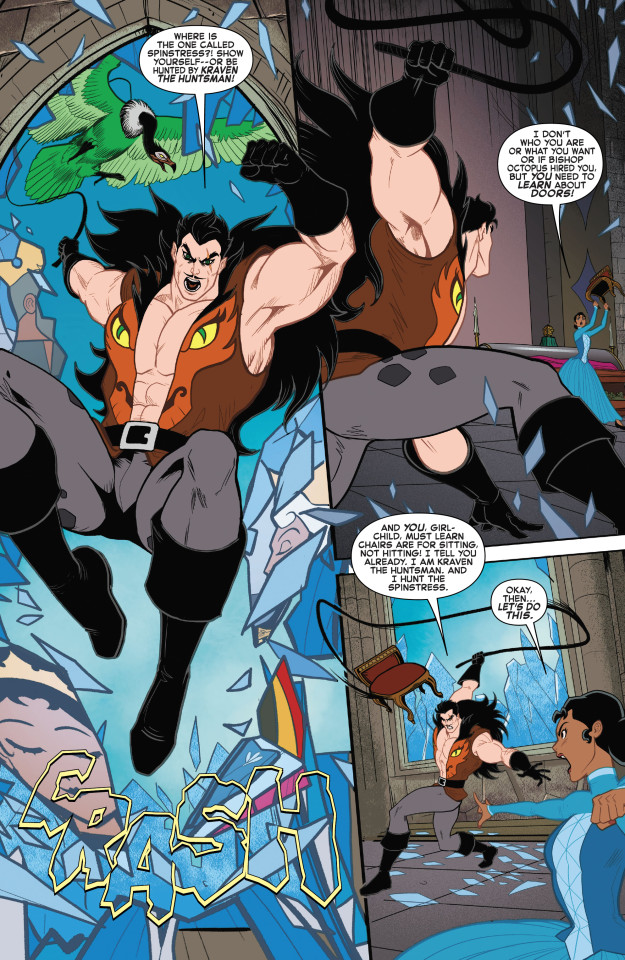

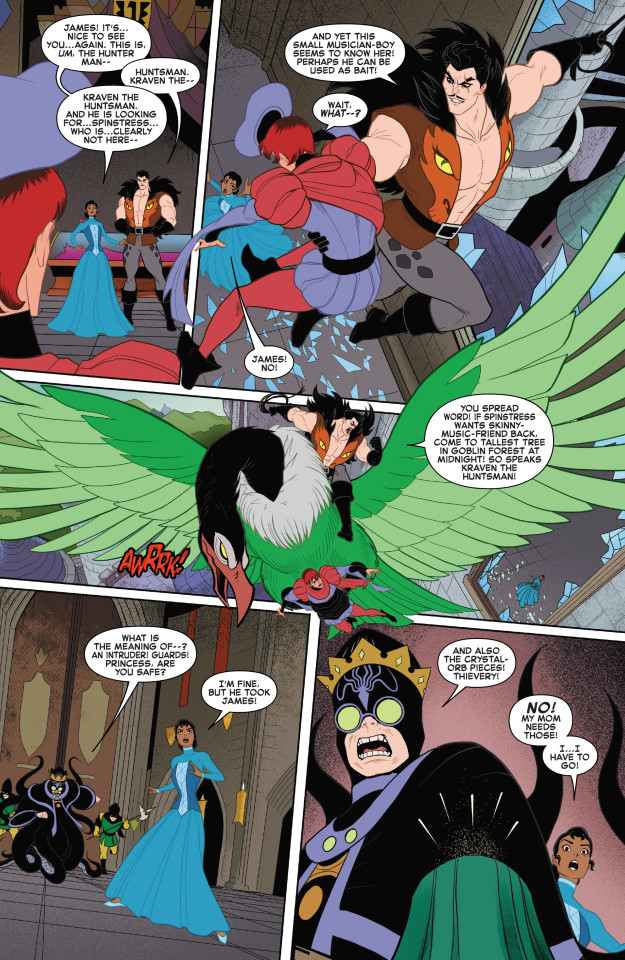

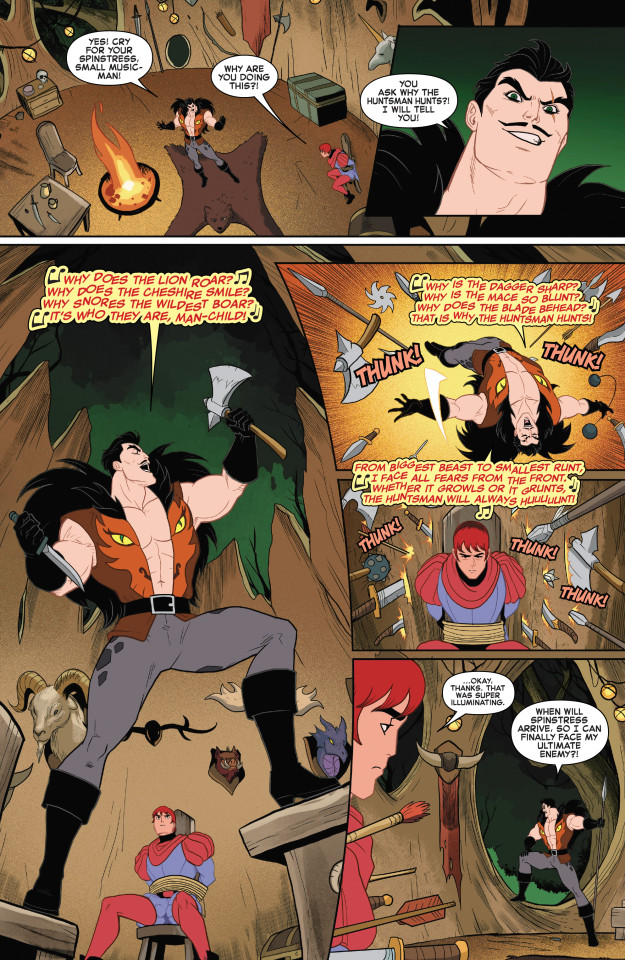



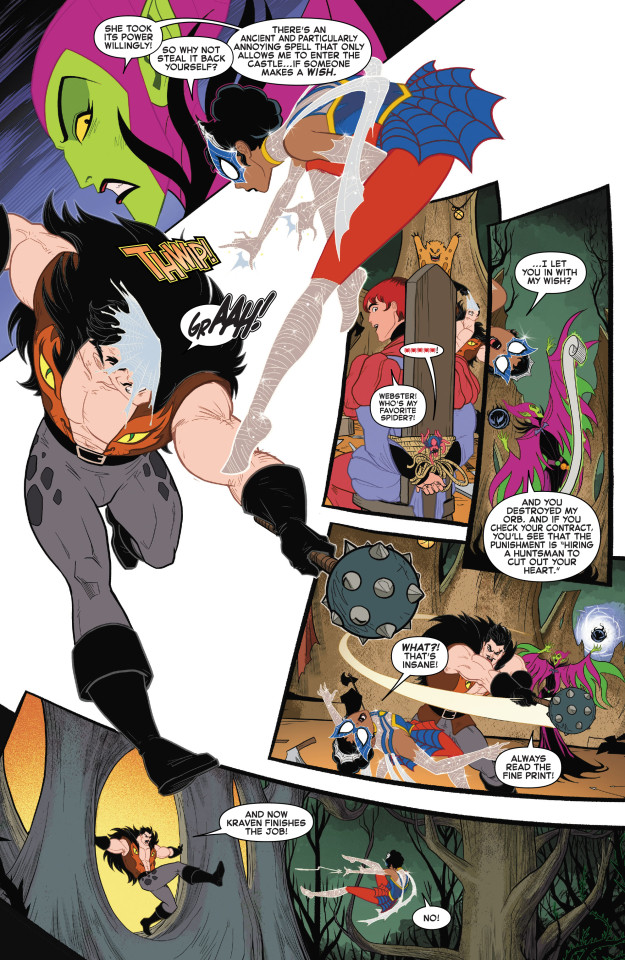
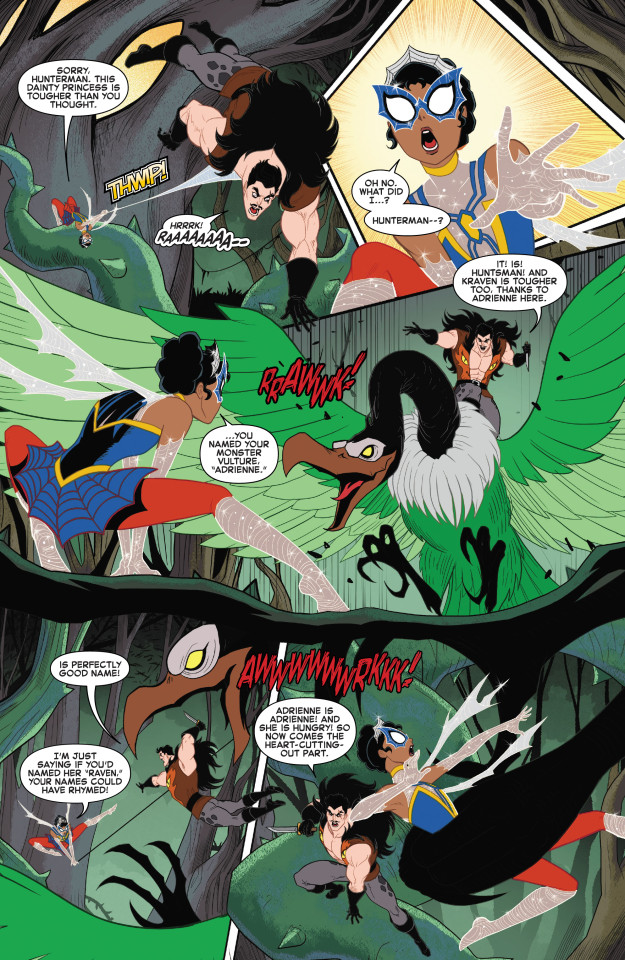
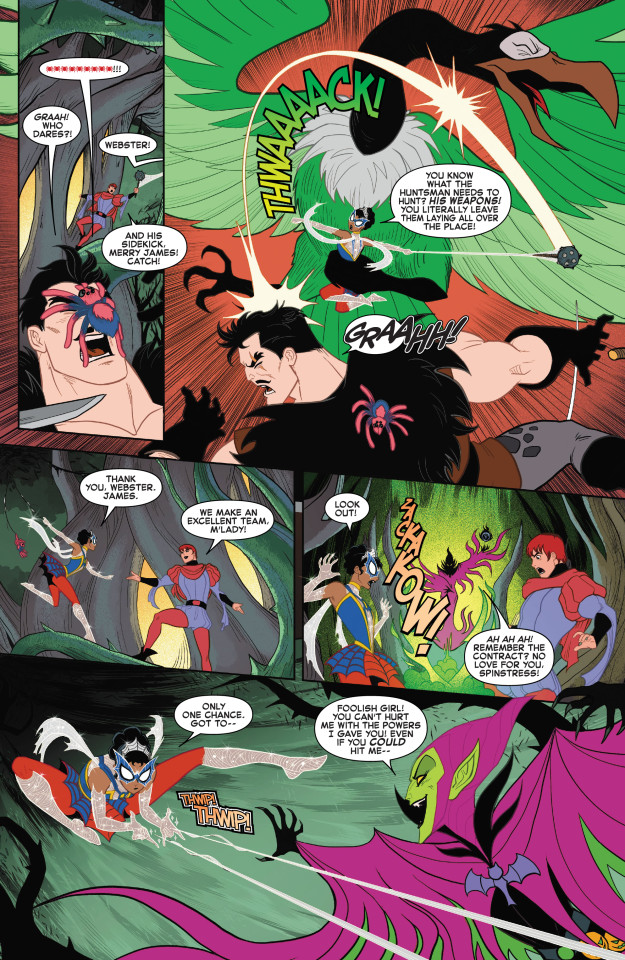
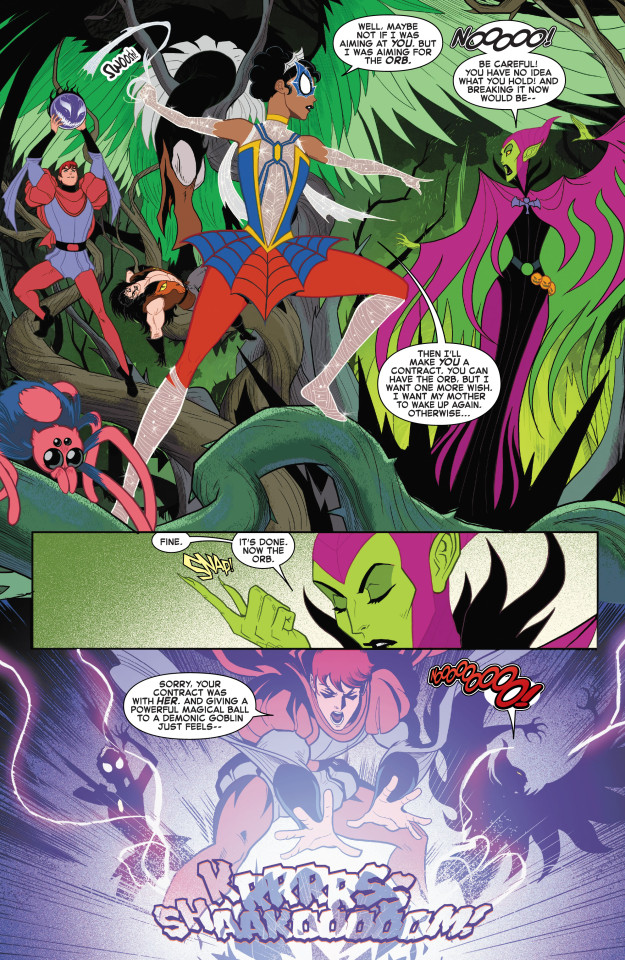
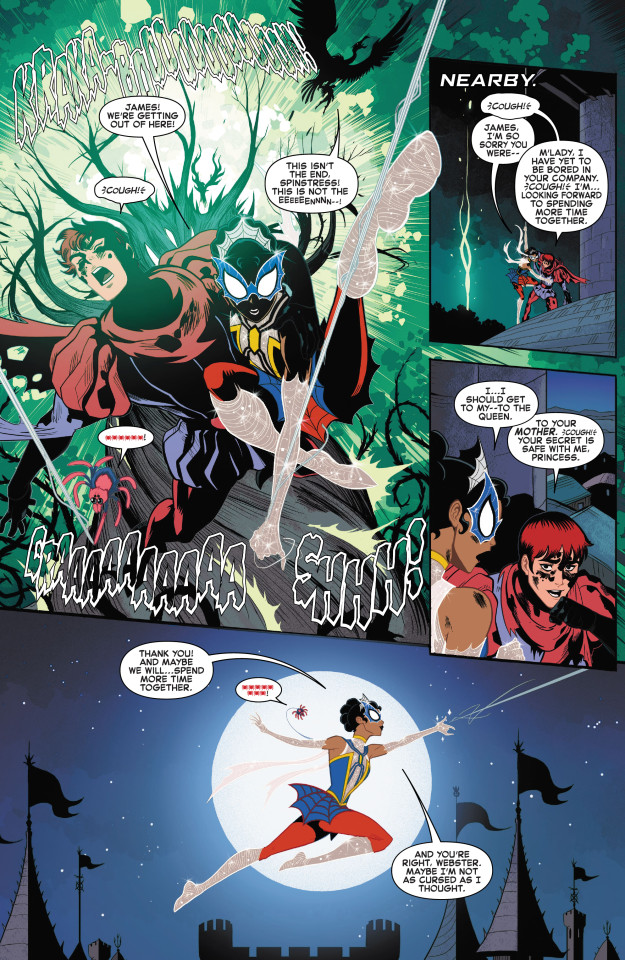
In this AU, the Spider-Man characters are the Fairy Tale characters. Princess Petra as Spintress is the gender-flipped version of Peter Parker while Merry James Watson the bard is the gender-flipped version of Mary Jane Watson. Also, in the Fairy Tale AU, the male musician is the dude in distress instead of the usual tiresome princess damsel in distress cliche. Kraven the Huntsman is the Fairy Tale AU version of Kraven the Hunter. Bishop Octopus is the AU version of Doctor Octopus except that he's not a villain yet. Vulture is a literal vulture but big and green. Norma the Fairy Gob-Mother is an unpredictable gender-flipped version of Norman Osborn.
Here, Merry James Watson is kidnapped by Kraven the Huntsman so that he could lure Spinstress into his hideout. Spintress races to the hideout to fight Kraven and save her boyfriend. While fighting Kraven, Norma the Fairy Gob-Mother appears in the battle to help Petra but rather for sinister purpose. After beating Kraven, Petra reunites with James only for Norma to appear and disrupt the couple. Both Petra and James smash the special orb before Norma could get her hands on it.
Edge of Spider-Verse v3 #2, 2023
153 notes
·
View notes
Text
Medusa’s Story Like Never Before (coming October 8th)
24 notes
·
View notes
Text
How to Write Devastating Betrayals (Pt. 1)
Here are some elements + tips on satisfying betrayals that will destroy both your characters AND your readers!
1. Relationship Between Trust and Betrayal
The #1 Betrayal Rule:
MORE TRUST = WORSE BETRAYAL
This is because TRUST implies 2 main things:
The traitor has probably PROVEN their trustworthiness, and now has a shared history + bond with the character they’re betraying
The traitor probably has access to a LOT OF INFORMATION about the character, whether it’s career-wise or personal. Probably at least some information the character considers STRICTLY confidential
An act of betrayal undermines Point 1 by manipulating Point 2 to their advantage.
So, if you want your betrayal to DESTROY, have the traitor be CLOSE with the character they’re about to betray. Lets compare examples:
you are a gang boss. You hire a new recruit who doesn’t really know anything except one insignificant operation, like “today we buy groceries at 2PM”
your recruit tells the rival gang about the grocery trip
→ betrayal doesn’t really matter that much
you probably didn’t place much trust in a new recruit
the implications of information leak are insignificant
→ not much plot weight
On the other hand:
you find out that the entire time, your RIGHT HAND MAN (also your childhood friend!) has been feeding information to the rival gang and sabotaging your operations
→ HURTS a lot more emotionally
might ruin everything you’ve built, career-wise, for good
→ LOTS of plot weight
From a completely SECULAR PLOT STANDPOINT (please don’t come for me, theologians), Judas’ betrayal of Jesus is a good example because:
Judas was one of Jesus’ disciples, a.k.a. the people considered closest to him, and who followed Jesus throughout all of his preaching years
Judas’ information about Jesus’ identity and whereabouts led to Jesus’ crucifixion → LOTS of plot weight (the entire Bible from a Christian standpoint foreshadows this moment, and every point after is spreading word of this moment. Talk about plot implications!)
ONCE AGAIN, I know all the “Jesus knew and allowed it to happen” “it was the will of God” stuff but this is purely used as a good plot example!!!!
2. Reason for Betrayal
“’Cause it’s super edgy/evil/cool” is DEFINITELY not a valid option.
All the plot points in a book build towards achieving a goal, and all the characters do things they think will get them closer to what they want. Likewise, the traitor must want a specific thing that ONLY betrayal can get them, or that betrayal can get them more efficiently.
People generally portray typical traitors as:
completely selfish with no personality trait aside from infinite ambition and ruthless pragmatism
a hero whose had enough
someone who sees the person they betrayed as a “worthless disposable” or something
Traitors don’t have to be morally bankrupt, even though betrayal is typically seen as something inherently bad, or just a bad means to a good end at best.
They can be conflicted about the betrayal (like Macbeth delaying his murder of King Duncan), remorseful about it (like Discord from MLP feeling super guilty after he hands the main protagonists over to the villain), or even do it for the “greater good.”
e.g. Brutus thought Caesar was becoming too power hungry, and would destroy the republic by becoming a dictator, so Brutus betrayed him to preserve the republic
→ example of a betrayal that was NOT self-serving
However, building on the MLP Discord example, a traitor can also have been manipulated into it themselves.
(For context, the villain basically promised Discord lots of power if he handed over the protagonists, but then the villain also sucked away Discord’s powers afterwards—won’t bother explaining MLP magic mechanics LOL)
3. Foreshadow It
A satisfying betrayal is usually a subtle, looming shadow that creeps over your plot before it makes its grand entrance during the scene when the character realizes the traitor sold them out.
A good example is in Shakespeare’s dramatization of Brutus’ betrayal:
Brutus’ loyalty to the REPUBLIC is made super clear throughout. When Caesar starts deviating, seeming more dictatorial, Brutus remains firm.
Their values are CLEARLY conflicting, so SOMETHING has to be done. Either:
they reconcile by both agreeing on either dictatorship or democracy
they turn on each other...and that’s what happens
Basically, planting the possibility in your reader’s mind is a great way to foreshadow a betrayal.
Other ideas could be:
traitor begins suddenly acting a lot warmer to the unsuspecting character, or even colder right BEFORE the betrayal
traitor is always TOO obedient and/or sycophantic
traitor acts suspicious, e.g. caught in lies, using inconsistent body language (ex. pretending to cry when talking about something really bad), caught talking to people they shouldn’t be talking to (e.g. rival gang)
∘₊✧────── ☾☼☽ ──────✧₊∘
instagram: @ grace_should_write
stay tuned for part 2!
Hope this was helpful, and let me know if you have any questions by commenting, re-blogging, or DMing me on IG. Any and all engagement is appreciated <3333
Happy writing, and have a great day!
- grace <3
#writers on tumblr#writing#writing tips#booktok#writer#writeblr#novel#writerslife#writergram#wattpad#betrayal#oc#writing stories#creating characters#characters#fantasy#ya fantasy#ya books#plot holes
280 notes
·
View notes
Text

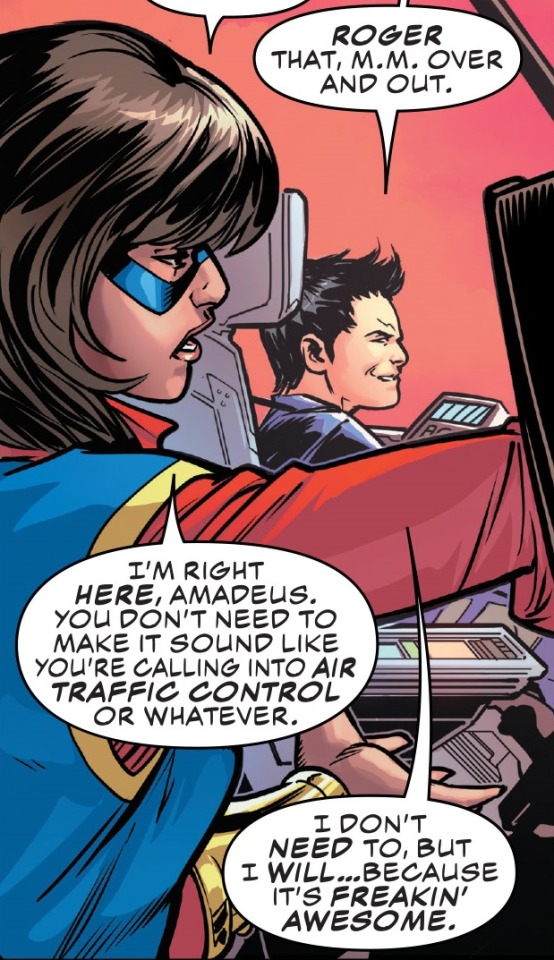

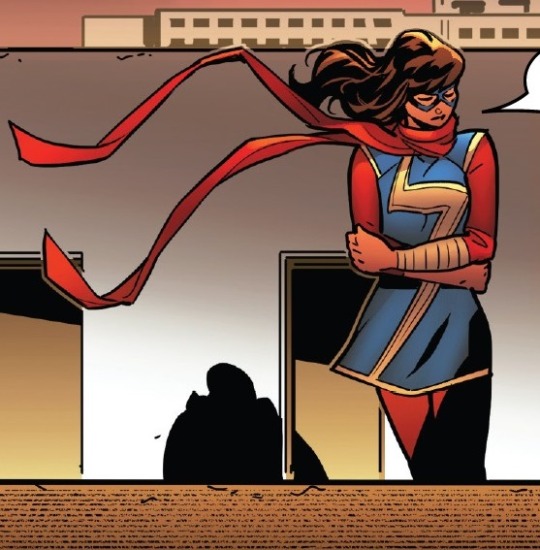


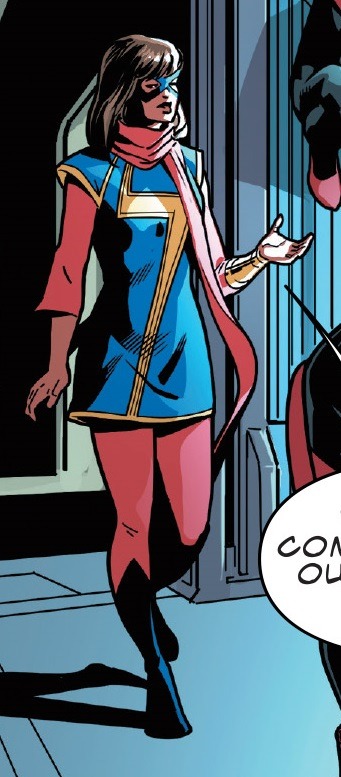
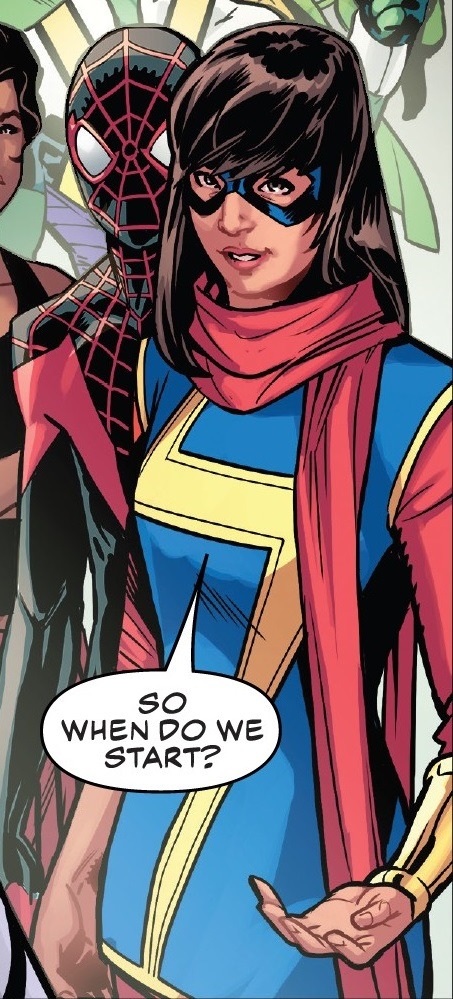

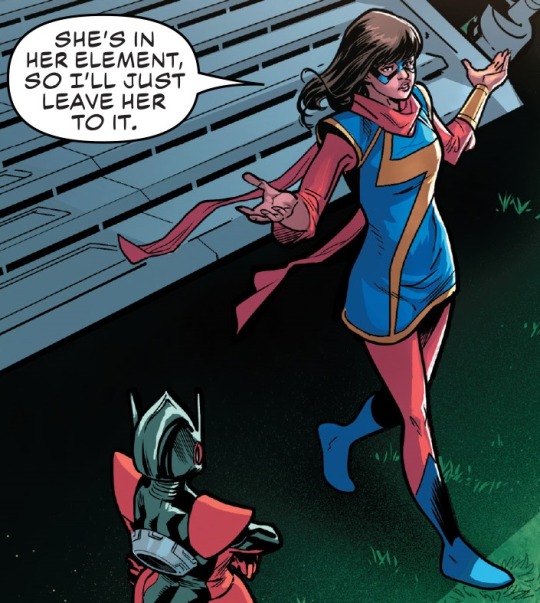
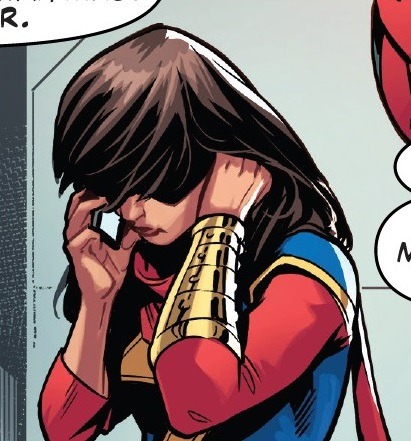



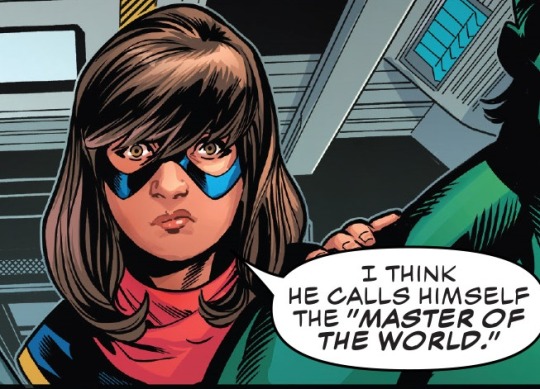




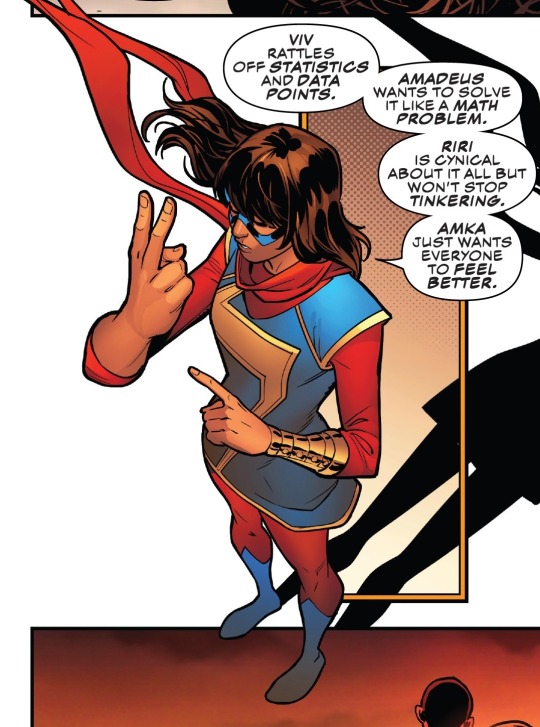
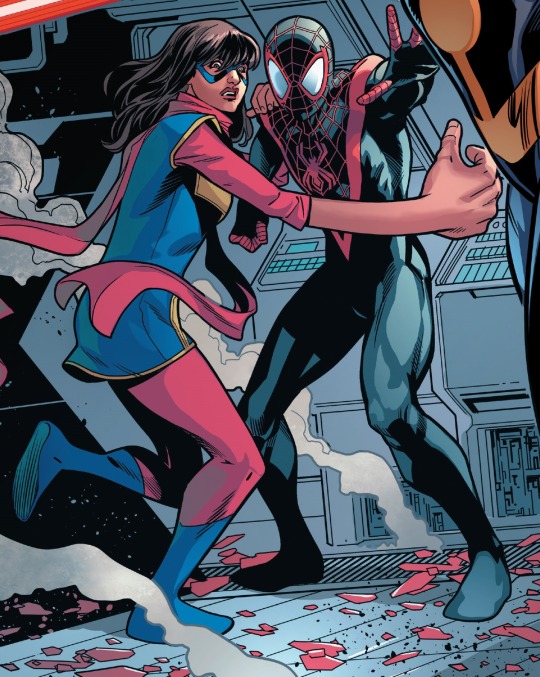


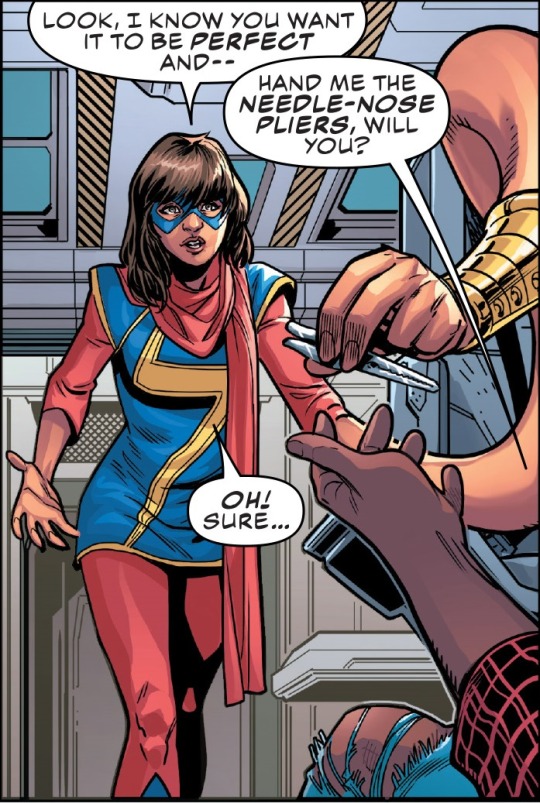

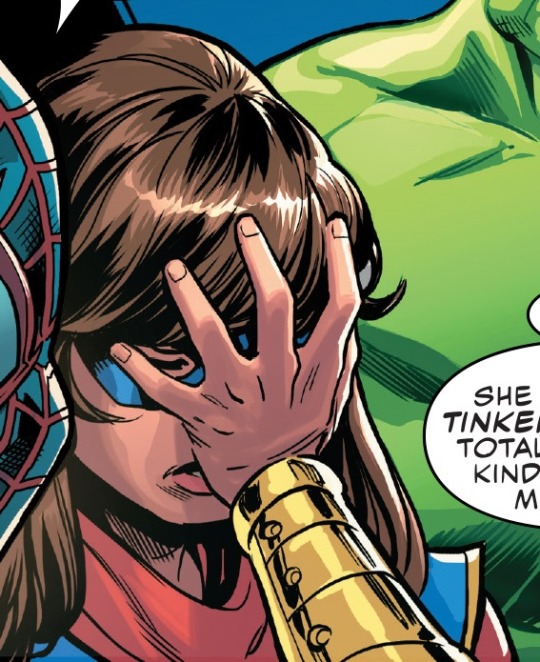
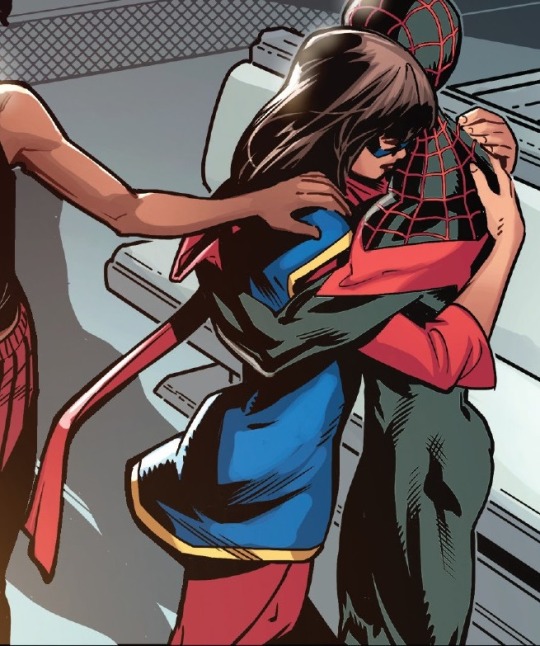
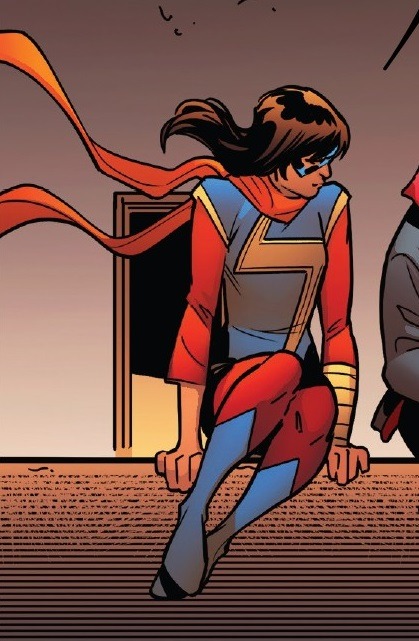

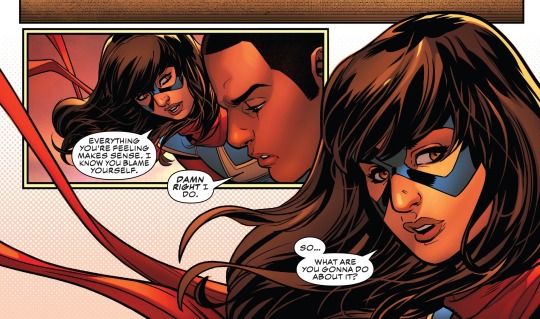
Ms Marvel (Kamala Khan) of Champions picspam
Art by Sean Izaakse
Champions v2 #19, 20, 24 and 25 (2018)
24 notes
·
View notes
Text
How to Finish Your 1st Draft (underrated tips!)
instagram: @ grace_should_write
Hey y’all :) Thought I’d revisit this topic because I have been writing later drafts and revision for the last 2 years—the last time I first-drafted was literally in 2020. I started first-drafting again late last year, and am still doing so this year.
I’m still rediscovering my plotting/plantsing process, and thought that a refresher would help me, too. I hope you find this post somewhat useful (and that these tips aren’t just for delusional people like me)!
∘₊✧────── ☾☼☽ ──────✧₊∘
1. Find your dedication
The dedication is so, SO underrated—many people think of it as just something you slap on after you’re finished the book, but I like to see it as also one more reason why you’re writing it.
Maybe you wrote a book featuring a found family group of kids from slums because you yourself grew up in those conditions, or you know/sympathize with people who did. Making sure that readers facing a similar situation will feel uplifted when they experience your book could be something that motivates you to finish.
For example, my working dedication for my current WIP goes something like this:
To anyone who has yearned for more and failed—all the part-idealist, part-pragmatist, ambitious, “average” kids who will “never amount to anything more,” I’m betting on you. Keep burning those dreams for fuel.
Cling onto them whenever you feel like you will become anything but great. Until you stop betting on yourself, it’s not over.
As someone whose often struggled to fulfil my own visions, despite having a grand plan for my own future, I—like anyone else—have encountered lots of obstacles and learned to survive on my own. We’ve all learned resilience.
This dedication reminds me who I’m writing for: myself, and anyone else who identifies with it. I hope that my book can inspire readers on the cusp of giving up. I hope this book can provide readers on their sigma male grindset with a thrilling rush that spurs them on even more.
Whenever I feel unmotivated, this is where I go. And, for the most part, it works!
(Of course, you can treat your dedication as a “work” of its own. Feel free to keep revising it and editing it until you’re happy with it)
2. Look at fan art
It can’t just be me who looks at fan art and gets inspired by specific poses or scenes and then adds those scenes into my book. Come on.
Pretty straightforward. Just search up “fan art for _____,” fan art for a specific fandom you’re into, or even “character scene/pose ideas” on Google or Pinterest.
Personally, I like doing this more than browsing those “book idea” posts that are followed with actual text explaining the idea—looking at art with little to no text can force you to do the work in describing the scene, pose, or character expression.
These scenes tend to help you be specific, creating memorable scenes for your readers. Examples of inspiration I’ve taken from fanart is:
A firework kiss scene
“I got your back!” type trope, where two or more characters fight back to back. IN THE RAIN!
Gunfights!
One character running away while slinging the other across their shoulder
Characters having fun at a festival while wearing flower garlands
When you’re writing, this can motivate you to get to X scene faster, or to finish your book faster so readers can see your characters doing X thing. At least, works for me!
3. Find ONE specific writing buddy
Yes, the writing community is GREAT. But, it can feel a bit detached if you’re always only sharing progress with your large group of followers, instead of someone who knows your WIP inside out.
Find one person or a small group of specific people. Tell each other EVERYTHING about your WIPs. This will feel a lot more personal, and specificity can also help you finish your book faster when they tell you to “finish writing this chapter to get to this scene!”, or when they hold you accountable to a group writing goal.
You can also all form a group chat with daily progress motivation and trackers. Personally, NaNoWriMo forums are great for finding people to just overshare your WIP with and motivate each other.
This way, you guys could also peer review your works periodically. Having another set of eyes on your draft—even when it’s not finished—could give you lots of ideas and guidance on plot direction, characterization, prose, etc.
4. Braindump while listening to a song / playlist
Write to the vibes. Literally just that.
Are there any songs/playlists that really resonate with you or your WIP? Just play it, maybe even on loop, and type ANY ideas from prose to dialogue to scene ideas and themes.
It could literally just look something like this (there is some purposefully bad writing just for this example):
Listening to: [title of your song or playlist]
A: Never thought I’d see you again. B: I know you missed me. *sneer* (Dialogue snippet)
omg they bump into each other on the street and she spills her beer on him and her best friend senses the chemistry (Scene idea)
rivals to lovers (Trope idea)
SILK DRESS. FANCY CLOTHES. YES. (Character design idea)
overcoming your greatest fear!!!!! (Theme idea)
It’s that easy. You got this, soldier.
∘₊✧────── ☾☼☽ ──────✧₊∘
I HOPE THIS HELPED ANYONE!!! Writing this definitely helped me LOL
Let me know if you have any questions through responses, re-blogging, or DMing me at @ grace_should_write on IG.
Happy writing, and have a great day!
- grace <3
#writers on tumblr#writing#writer#booktok#Novel#writeblr#Wattpad#writerslife#novel writing#Writing tips#writergram#ya fantasy#young adult#YA Books#Character Design#characters#oc#writing a book#fantasy
41 notes
·
View notes
Text
Creating gods and goddesses for fantasy
instagram: @ grace_should_write
Impressive. A semi-decent posting schedule actually adhering to at least once a week? No way...
I feel like my life is SLIGHTLY back on track now. School ended and so did my first summer camp!
I know many of you guys are fantasy writers, or are just interested in myths and gods. I hope this post helps you, or is just some random jargon for you to enjoy :)
∘₊✧────── ☾☼☽ ──────✧₊∘
1. Getting inspiration
From Classical myths to modern fantasy fiction, you’ve probably encountered many created gods already.
However, creating gods yourself is a bit more than piecing together all the things you already know about existing ones.
For further inspiration to create more complex gods, consider deliberately diving into:
Wikipedia pages about different cultural mythologies! You can find rich mythical lore in so many cultures, including (not-ordered in any way):
Greco-Roman
Chinese
Nigerian
Mesopotamian
Arabic
Japanese
Irish
Frankish
Norse
stories other people tell you—whether your family or friends—about their own cultural mythologies, and how such lore is significant to this day
the world around you. Go for a walk, hang out with your friends, do whatever! Think about things a bit more deliberately. For example, you could…
come across a creek, and consider a god of small freshwater bodies
have an excellent night out with your friends, and formulate a goddess who presides over platonic bonds
do your homework, and think about how beautifully complex a god of mathematics could be!
Try to piece together your gods’ identities by mixing and matching characteristics you find from various different deities.
With more sources of inspiration, your god or goddess could be better and more original!
2. Core Identity
As humans have their own characteristics, gods do, too. Some main things to consider are:
your god is the god of what?
this can range from one thing to many things
ex. Poseidon is the Greek god of the oceans, but also of horses, earthquakes
consider logically branching out your god’s domain to other things related to it.
ex. Demeter is not only the Greek goddess of agriculture and harvest, but also of the life cycle (makes sense logically because the life cycle of crops correlates with many other life cycles, like human or animal ones)
or, Athena is not only the Greek goddess of wisdom in wartime but also peacetime crafts (like weaving), which are associated with skill and intelligence as well
your god is symbolized by what? This may branch off point 1. Think about something your god has power over. For example:
Poseidon may be symbolized by a trident (used for spear-fishing, which is associated with the OCEAN—part of his domain)
Demeter may be symbolized by a sickle (used for harvest, which is associated with AGRICULTURE—part of her domain)
Athena may be symbolized by an owl (typically seen as a wise and observant animal, which is associated with WISDOM—part of her domain)
typically, symbols include:
animal representatives (consider an animal’s stereotypes or characteristics—ex. foxes with slyness, owls with wisdom, etc.)
weapons and/or tools
objects (like Athena and a weaving loom, or Poseidon and a fishing net)
particular sayings or epithets as titles (ex. Pallas for Athena, meaning “young woman” or “brandishing a weapon”—translations are skewed, but you get the idea
powers?
this is often related to the god’s domain, but they may also pick up powers through other means (or even practice!)
what do they look like?
are they humanoid? can they choose to appear attractive, or in any other form, for that matter (a Lovecraftian Eldritch horror? an animal? a cloud of gold, like Zeus?)
what form do they usually take? Is there a conventional form for gods, at all?
what is their personality like?
you could consider a range of things, from prominent traits to stress factors, using many tools—things such as enneagram or MBTI apply, too!
gods have personalities as dynamic as humans do!
For example, Zeus’ rather cocky and domineering personality is seen through his actions, while Aphrodite’s flirtatiousness and subtle charm may be more apparent.
Hephaestus’ work ethic and emotional resilience is also shown through his stories, just like how Hermes is generally portrayed as more of a fleet-footed trickster.
Point is, know the most relevant things about your god or goddess, inside and out. That will make them much more interesting characters to write about, and read about!
3. Genealogy, and relationship with other gods
Most gods in mythology are related to each other in some way—have you ever seen a Greek mythology family tree? If you have, you get the idea. It looks like this:
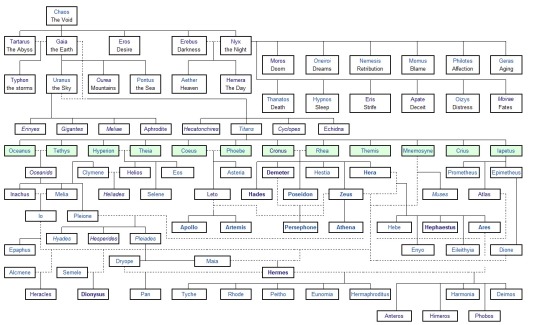
And that’s just a simplified version.
Unless you’re trying to go full-scale epic god fic, you probably don’t need something half as detailed.
Just knowing the relationships—whether familial or other—between all your gods will help interactions write themselves.
In most mythology and fiction, gods are just like humans in their interactions. The exact same relationships exist between them as in humans, although humans probably have a much lower rate of incest:
sibling rivalry
best friends
extremely enamoured lovers
bitter enemies
annoyingly overprotective parents
teacher, student
abusive relationships
And so forth. Naturally, you could apply many relationship tropes to the relationships between gods (and maybe even other creatures, like humans) as well.
For depth, try defining the relationship of your god to other gods first, and then move onto them each. A simple list like this could work:
Persephone
daughter of Zeus and Demeter
niece of Hades
wife of Hades
sister to Athena, Apollo, Artemis, Dionysus, etc.
mother of Melinoe, Zagreus
A simple list like this—and maybe even a family tree/table, if your lore is more complex—would help a lot with defining relationships.
4. How do they affect the rest of the world?
What is your god’s standing among the entire world, and among humans?
Try to integrate this with worldbuilding. Consider assigning gods to organized religion (if you have any), or creating fun things like cults, sketchy alliances, and major religious events.
In terms of religion, worship often occurs when people are trying to appeal to a specific attribute their god has the power to bestow.
For example, Ancient Greeks might have sacrificed to Demeter for a good harvest—as she was the goddess of harvest—or prayed to Aphrodite for beauty—as she was the goddess of beauty.
Relating these religious practices back to the god’s identity (see point 1, or part 1 of the post on IG) is key!
Furthermore, their presence may influence many creation myths or general myths that explain the world.
For example, a prominent Ancient Greek explanation for the seasons was that Persephone, daughter of Demeter and Zeus, had been kidnapped by Hades to be his bride in the underworld.
After many protests by the gods, especially by Persephone’s mother, Demeter, it was arranged that Persephone would spend half the year with Hades and the other half with Demeter.
Demeter—who had power over nature on earth—made nature abundant and beautiful during the months Persephone would spend with her, while Persephone’s return to Hades would cause Demeter to will the earth to wither again.
These periods of growth and decay, originating from this myth, became a way the Greeks explained the four seasons.
This is a classic example of how the actions of your created gods can impact the world you created!
∘₊✧────── ☾☼☽ ──────✧₊∘
WHEW!
Another fun tips post :) Just as a PSA, though, the reason why I focused so heavily on Greek mythology examples is because it’s what I’m most familiar with, personally.
I am absolutely not asserting that one culture’s mythology is superior to another—I was simply a massive Percy Jackson fan as a kid, and later on, a Greco—Roman culture geek.
Hope you guys enjoyed it! Have fun with your breaks (I’M SO EXCITED FOR THE REST OF SUMMER).
Once again, if you have any questions or just want to TALK ABOUT ANYTHING, reblog this or DM me over @ grace_should_write on IG.
Happy writing, and have a great day!
- grace <3
#writers on tumblr#writing#writer#novel#booktok#writeblr#writerslife#wattpad#writing tips#fictional characters#gods and goddesses#greek gods#roman gods#percy jackson#greek mythology#roman mythology
28 notes
·
View notes
Text
It’s time to stop treating first dates, first kisses, and losing virginity as milestones or rites of passage that must be completed. It’s time to stop expecting these things to happen in everyone’s teen years or even in their twenties. It’s time to stop letting people call themselves “late bloomers” for getting their first kiss at 16. It’s stupid. It’s unnecessary. It’s damaging to people who for whatever reason it may be don’t have romantic prospects or don’t even want to do those things.
31K notes
·
View notes
Text
Writing Childhood Best Friends to Lovers
instagram: @ grace_should_write
This is a super popular trope, and these are some of my personal takes on how to write it properly!
ALSO, SORRY FOR THE LACK OF POSTS. Finals season and extracurricular performances have KILLED ME this past month. But, I hope this means more consistent posting 🥲🥲🥲
Thanks for sticking by, and enjoy these tips!
∘₊✧────── ☾☼☽ ──────✧₊∘
1. Flesh out their history
Childhood best friends means what it says—they were best friends during CHILDHOOD. As the author, you must know what their childhood was like.
For practice, you can do things like:
writing out important backstory scenes that were CRUCIAL to their relationship
ex. a big fight, when one of them helped out the other in a very bad time, when they became friends, etc.
creating a TIMELINE of their relationship
often based on point 1, with important moments being roadmapped to show how the relationship developed
thinking of moments that produced EXCLUSIVE MEMORIES to the best friends
ex. inside jokes and specific references, “remember when ______?” and “he reminds me of ______!” moments, friendship bracelets worn to this day, etc
Exercises like this make the trope more realistic—you’re showing to yourself how the children became BEST FRIENDS, and how their relationship was defined after it was determined.
2. Something has to change
Childhood best friends don’t just become lovers—something needs to change!
Whether it’s puberty increasing horniness by 100%, not seeing each other for a while, or anything like that, something has to happen to move them away from the “friends” route and onto the “potentially romantic” route.
Here are some ideas:
one or both glow up
new jobs, new schools, new setting in general
they suddenly meet once more after a long period of time (ex. 10 years)
on that note, they could meet in DANGER (like a heist or a battle), in a ROMANTIC setting (ex. seeing each other awkwardly at a bar), a CORPORATE setting, a SIMILAR SETTING TO THEIR CHILDHOOD… (could be anything!)
they help out a mutual friend who doesn’t know they know each other, but then they see each other again and are SHOCKED
a childhood betrayal (at least interpreted as such by one party) leaves them not speaking… but they meet again! (this is GREAT for cleaning the slate AND embittering the memories!!)
3. Make it awkward
They shouldn’t immediately accept the change (usually). Human nature generally makes us change-averse, so having a period of shock and denial over brewing feelings is very natural. It’s also a NATURAL source of conflict!
Generate conflict ideas from the awkwardness. They can:
actively fight against the relationship (ex. being a bit meaner when they see each other)
be colder towards each other
hold childhood memories AGAINST each other (using the BAD memories to undermine the other person)
avoid each other, but not stop thinking about the other person….
mentally compare their former relationship to this one, asking themselves “what happened?” “what changed?” “…HOW DID WE GET HERE?”
notice NEW THINGS about the other person, and think of it in a more resentful light: ex. “Your hair was shorter back then…I don’t know, seemed more practical.” “I’ll bet you can’t even swim the length of our old pool now—not like you could.”
Before they get to the ROMANCE stage, this period of iffy “wtf” is an excellent source of angst and conflict.
4. Something BIG happens
Big doesn’t always mean LARGE-SCALE BATTLE DRAGONS MAGIC BULLETS FLYING SWING SWING (although it could)—it’s simply something that affects one of the characters deeply.
Some ideas include:
the death of a close friend or family member
the loss of a job or a dream slipping out of reach
a tumultuous break up
a near-death experience
one of the characters suddenly disappears
a vestige of their childhood is destroyed
one other close friend or family member betrays them
These are all heavily impactful things that have the power to ruin someone, at least for a period of time.
During this time, because the characters are too busy focusing on this disaster than anything else, it will make it a lot easier for the childhood best friends to become close again.
It gives them more opportunities to show how much they care about each other, and to actually be there for the other person as they go through it.
Eventually, they’ll realize through these massive series of development that the one for them was right in front of them! IF it’s a happy ending >:)
∘₊✧────── ☾☼☽ ──────✧₊∘
THANK YOU GUYS FOR STICKING BY!!!
I promise, I’ll try to post more! I miss the writing community so so much and I can’t wait to have more time to dedicate towards it <3333
Let me know if you have any questions through responses, re-blogging, or DMing me at @ grace_should_write on IG.
Happy writing, and have a great day!
- grace <3
#writers on tumblr#writing#writer#booktok#novel#writeblr#wattpad#writerslife#writing tips#fictional characters#tropes#childhood best friends to lovers#writergram#ya fantasy#young adult#ya books
283 notes
·
View notes
Text
Top 3 Poetry Mistakes to Avoid
instagram: @ grace_should_write
DISCLAIMER: These are my personal takes applicable to MAINSTREAM poetry!
If you want to just write for yourself with no need of validation from things like competitions or literary magazines, FEEL FREE TO IGNORE THESE, PLEASE! /gen
Hey writers! Poetry is one of the most undercovered topics in fiction writing communities, so I hope this post helps add some value to your writing journey :)
Now, here we go—top 3 poetry mistakes to avoid!
∘₊✧────── ☾☼☽ ──────✧₊∘
1. Too much abstract language
This is the “show, don’t tell” version of poetry!
Especially in mainstream poetry currently, the poet is expected to convey ideas through very specific imagery.
This is why poets who rely too much on abstract language like “democracy,” “justice,” “love,” or “freedom” are rarely featured in competitive publications.
Instead of saying “I’m in love,” think about WHAT IT LOOKS LIKE!
Think about the sensations, such as how your heartbeat pulses faster, blood and warmth rush to your face, or how you breathe a bit quicker when you approach the person you love.
Rather than talking about “freedom,” DEPICT IT IN IMAGES! Is it the shattering of chains? The way you are free to sing any song you wish? Does it remind you of the wind, the mountains, or maybe a bird?
What about “justice?” Common images include scales, a blindfolded woman, a sword, the motif of judge, jury, executioner, and many other ones.
Basically, ask yourself: WHAT DOES _____ LOOK LIKE? FEEL LIKE?
Greatly consider imagery and sensation! Here is a non-exhaustive list of things you can focus on:
smell
particular sweet scent? familiar aroma? evoke something specific, like your mother’s slightly burnt brownies, or the lingering of rain on dry soil
sight
colour, shape, texture, a specific thing? person? what does it / do they look like?
touch
not just from your hands, but anywhere else on your body. does your neck strain against an iron clamp? do their fingers brush against your arms, sending tingles up your spine?
sounds
what type of sound is it? a clanging? the harmonious tinkling of wind chimes; the dissonant wails of a desolate crowd? what sort of emotions does it evoke in you?
taste
a very distinct and underused sense! for example, if you want to paint the picture of blood and just describe something like a copper / metallic taste on someone’s tongue, readers may immediately associate it with blood
emotions
but even when describing them, USE A MIX OF ALL SENSES! as examples, grief might be a very heavy, paralyzing feeling that’s akin to Atlas straining under the sky, while giddiness feels like gliding on water or flying through the sky as the wind tousles your hair
Remember, THE KEY IS TO BE SPECIFIC! SHOW, DON’T TELL!
Try to IMPLY what you mean by using heavily connotative language and painting very specific images!
Most of the beauty in poetry is in subtlety and creativity :)
2. Mixed Metaphors
Although this entire list is based on common mistakes, this one is definitely most common among people trying to sound skilled.
Mixed metaphors are comparisons between things so unrelated that it sounds more uneducated than trailblazing.
This is often produced when a writer tries to combine two metaphors, but ends up with something totally ridiculous. Hence, it’s mixed.
The line may be blurred for certain things, but there are various OBVIOUS examples such as some that I will add here:
“Don’t beat a dead horse in the mouth.”
beating a dead horse + look a gift horse in the mouth
“It’s easy; it’s not rocket surgery.”
it’s not rocket science + it’s not brain surgery
“I’m not the sharpest crayon in the shed.”
sharpest tool in the shed + brightest crayon in the box
Not only do mixed metaphors obscure meaning; they make the writer sound far less skilled than intended!
3. Unintended Connotations
Aside from mixed metaphors, however, considering the connotation and logical flow of imagery / words is extremely important.
For example, maybe you want to evoke feelings of deep sadness in the reader while using the image of the ocean.
Painting the image of a calm, sunny ocean with barely any turbulence and the bustle of a nearby harbour might be less effective than an image like…
a lone sailor walking along the beachside as he watches rags wash up the cloudy shore.
also invokes loneliness
the remnants of a shipwreck, like wooden planks, cracked boards, rusted metal parts, or a torn sail emerging from the waves on a sunny day
also invokes eeriness
the personification of the ocean as an entity who lunges for the sky, reaching its waves like watery arms up to the moon at night, desperate for an embrace
also invokes longing
These are just a few examples of what you could do with a single, specific image alone.
Think about all the ways you could invoke unique emotions by carefully considering the connotations of your words!
I’ll make a separate post soon more on this subject, because there’s just SO much to cover regarding connotations :)
∘₊✧────── ☾☼☽ ──────✧₊∘
I will be making a part two because of the sheer number of tips there are! Thank you guys so much for checking this post out <333
Let me know if you have any questions through responses or re-blogging, or DM me at the instagram at the top.
Happy writing, and have a great day!
- grace <3
#writers on tumblr#writing#writer#booktok#novel#writeblr#writerslife#poetry#writers and poets#poets on tumblr#writergram#ya fantasy#young adult#ya books
9 notes
·
View notes
Text
why are y’all trying to push MINECRAFT YOUTUBERS to be activists? like you get baby rage when they don’t speak out, but i guarantee you the moment that they DO speak out, under educated and possibly incorrect, you’ll ridicule and cancel. ur literally setting your fav up for failure. how immature and delusional do u have to be ??
33 notes
·
View notes